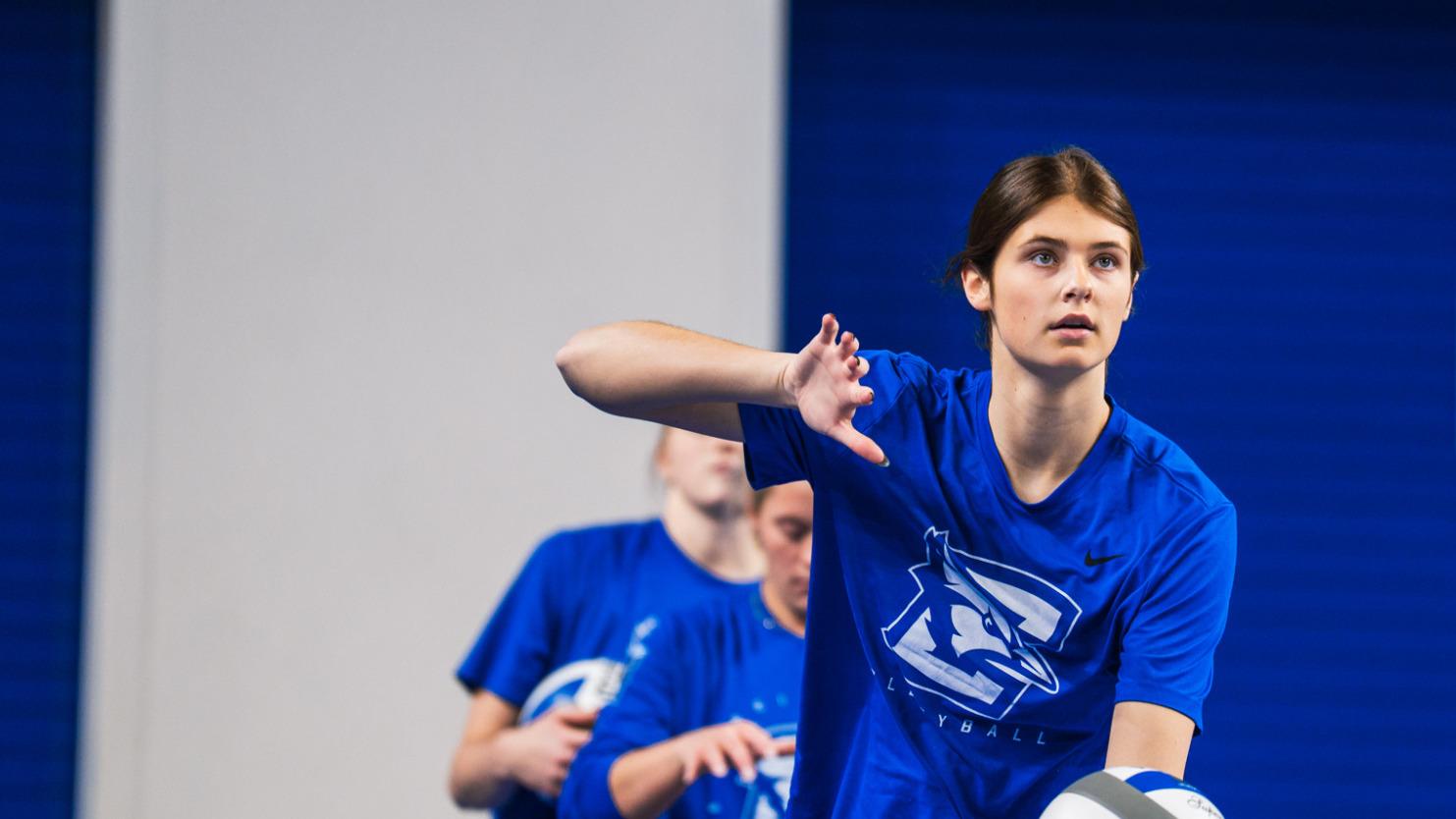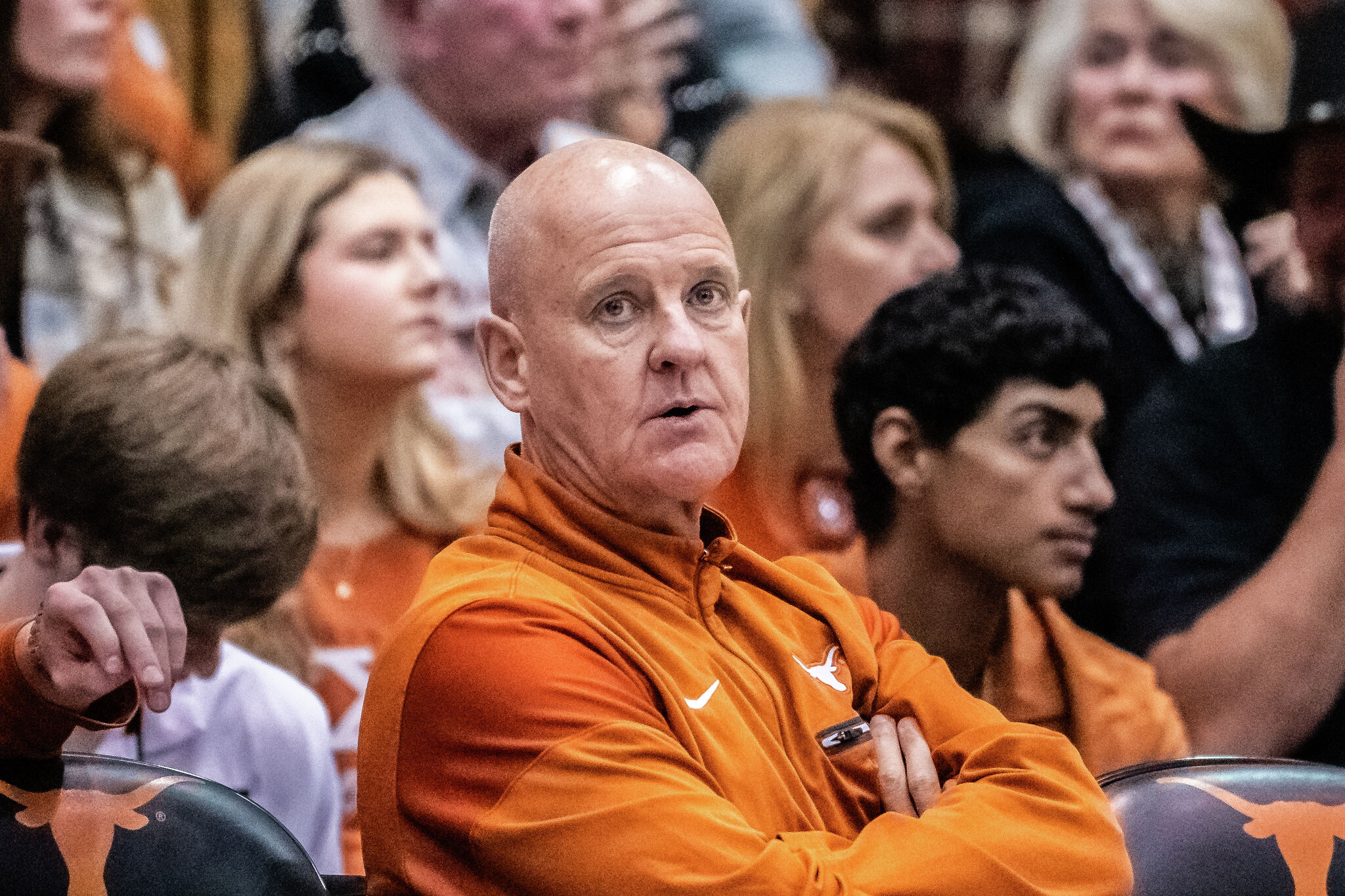Sports
‘Bit humbling going from the Olympics to being the very worst player on a team that has 14-year-old girls on it’

Olympic swimmer Erin Riordan on life after the Paris Games playing water polo with teenagers
Water polo might not be the most common answer to the ‘what-the-Olympian-did-next’ trope, but for Riordan, it was the right antidote to help her immediate post-swimming life. She went to her first water polo training session at the National Aquatic Centre in Abbotstown with her new club, St Vincent’s Water Polo Club, just a month after the Paris Olympics. Two weeks ago, she helped them win the Irish Senior Cup in Limerick.
“A bit humbling at the beginning going from the Olympics to being the very worst [player] on a team that has 14-year-old girls on it,” Riordan smiles. “At the moment, I’m in the mind space of ‘I want to enjoy’ sports, first and foremost, to be doing it because I want to be there. The Olympics were a heavy mental and emotional toll on me. I wanted a break from that.”
Co-existing with intense change has been part of Riordan’s story over the past year. After the Irish women’s 4x100m freestyle relay initially missed out on qualifying for Paris by one spot, Riordan retired from the sport at age 24. The twist came when Japan withdrew from the event in June, which meant Ireland got back in through the ranking system. Riordan had to unretire herself and had just a month to prepare for her first Olympics.
The breaking of an Olympic dream and the scramble to put it back together in such a short time left rough edges.
“The few months leading up to Paris were probably the most emotionally strained I’ve been in my life,” Riordan said. “I think I’d already grieved, grieved the loss. I had decided, ‘OK, it’s not happening for me, I’m not going to the Olympics’. And then, two weeks later, it was, ‘Get back to Dublin, you might be going’. It took a big toll on the mind more than the body.
“I think I kind of had a sour taste in my mouth from swimming after, even though I had this amazing experience and I’ll never forget that. I didn’t even want to do the swim sessions with the water polo team. I managed to force myself to do it.”
The intensity only escalated when she got to Paris. The relay team came 16th overall in their heats on the official opening day, but then she tested positive for Covid afterwards and had to leave the village immediately. The five-ringed experience didn’t hit the peak she imagined.
“You do build it up in your head a little bit and then you get there and you’re like, oh my goodness the food is not nice, the hotel is not nice. I got Covid when I was over there. I was not well when I raced. I tested negative before I raced and tested positive after, so I got sent home immediately.
“You walk out and you’re like, this is it, this is the moment. And then you’re also like, oh this is it. Two edges of a sword, I guess.”
Her new sport brings her into contact with her old home. The first time she walked into the National Aquatic Centre to go water polo training, she felt a shudder, “post-traumatic stress disorder from all the training” from her swimming days.
While there was an element of a team when she competed in the relays for Ireland, it’s not the same as competing in an actual team like water polo (a physical sport described as a combination of swimming, basketball and wrestling).
“In Paris, we were all really good friends, we were all doing the same event, but we were also all competing to get onto the relay. You’re there for each other, but you’re also, ‘I want to beat her’. It’s a hugely different dynamic. Whereas in water polo, it’s like everybody is taking a share of the pressure, it’s not one person’s fault, it’s the team. That’s something I’ve never experienced before and it’s been so refreshing to be a part of that.
“I didn’t realise how physical the sport was. People are wrestling each other in the water, but it’s almost refreshing to see that in a women’s sport because that’s not how we’re meant to behave I guess, but it is very physical, very aggressive.
“It’s different, even learning tactics and stuff, I’ve never really done anything like that, just swim in a straight line and hope for the best.”
Post-Paris, Riordan has started working as a documentation specialist with a pharmaceutical company in Grange Castle, Dublin. She’s also training for the marathon in Lisbon in October.
“Something I always knew coming out of swimming is that I can’t just stop activity altogether. I think I get quite down if I do. So I picked up all these sports, I’m just trying everything out. Before I used to work my life around my sport, whereas now I’m working sport around my life. It’s a different dynamic for me.”
Sports
How Sweet It Is: No. 3 Badgers take on NCAA Regionals

MADISON, Wis. – The No. 3 Wisconsin volleyball team will look to continue their NCAA Tournament run, as they are set to take on No. 2 Stanford in Austin, Texas, on Friday, Dec. 12 at Gregory Gymnasium. The match will begin 30 minutes after the conclusion of the first regional semifinal between No. 4 Indiana and No. 1 Texas, slated to start at 11:00 a.m. CT. Both matches will be televised on ESPN.
The Badgers (26-4) advanced to the NCAA Regionals behind a pair of stellar performances in back-to-back nights of action—defeating Eastern Illinois and North Carolina at the UW Field House to punch their ticket to the second weekend for the 13th consecutive season.
The offense continued to be efficient in the pair of matches this past weekend, as UW enters the NCAA Regionals with the second-highest hitting percentage in the country at .322. If the mark holds, that swinging percentage would break a school record.
Outside hitter Mimi Colyer was one of the multiple standouts from the weekend, recording 22 kills and 13 digs versus the Tar Heels for her eighth double-double of the year. The senior was recently named the Player of the Year in the AVCA All-North Region release. She was joined by four other Badgers on the First Team list in middle blocker Carter Booth, libero Kristen Simon, outside hitter Una Vajagic and right side Grace Egan.
Simon, in being one-of-three freshmen garnering that honor, continued her quality play from the back row for UW. In both postseason matches, the Badgers held their opponents to a hitting percentage of .250 or lower. The freshman racked up a combined 31 digs in the process, leading the team in both matches. In doing so, Simon passed Kristen Roman for fifth-most digs by a freshman in program history.
Wisconsin enters the Lone Star State in search of their first win over the Cardinal (29-4) in team history. The units have battled six times, with Stanford coming out on top in each match—including the 2019 National Championship match.
The Cardinal defeated Utah Valley and Arizona en route to a berth to the NCAA Regionals, doing so in four sets in each match. They enter with a strong postseason pedigree, winning nine national championships while appearing in 23 Final Fours.
The two teams last met in Milwaukee at the Fiserv Forum last season, as Stanford walked away with a four-set victory. Setter Charlie Fuerbringer, in her freshman season, posted a career-high five kills against the Cardinal in that match. Fuerbringer racked up four in each match this past weekend—continuing to be a spark on the offensive end.
In head coach Kelly Sheffield‘s tenure at Wisconsin, the Badgers hold a record of 10-2 in NCAA Regional Semifinal matches. Last year, UW won a five-set thriller over Texas A&M to advance to the NCAA Regional Final.
With a victory on Friday, the Badgers will play the winner of Indiana vs Texas on Sunday, Dec. 14. The start time for that match is still to be determined.
Sports
#11 Volleyball Meets Media, Makes Final Prep For Sweet 16 Match

Creighton head coach Brian Rosen, along with seniors Kiara Reinhardt, Ava Martin and Annalea Maeder met the media prior to the team’s 90-minute practice inside Memorial Coliseum, which will host the action.
First serve between Creighton and Arizona State is set for 12 p.m. Central. The contest will be nationally-televised on ESPN2.
NCAA Volleyball Lexington Regional
Historic Memorial Coliseum – Lexington, Ky.
Creighton-Arizona State Pre-Match News Conference
Creighton Head Coach Brian Rosen
Opening Statement …
“Obviously, just really happy to be here to still be playing, to be in the Sweet 16. We’ve had these goals for a long time now, especially two of the seniors have been here four or six years. They came here and chose Creighton for opportunities just like this. I am just really proud of them and our whole team to get to this point. I’ve actually never been to Lexington before, so this has been fun. I didn’t know that Creighton and Kentucky have a long history of playing, eight straight years of playing in those tournaments together. I was there for the last year of that, but it was at Creighton. That one didn’t go very well. So hopefully if we got a chance to play them, we didn’t be a little different. Arizona State’s a great team. Lots of firepower all over, really good block. We’ve gotten to watch them quite a bit on film and things like that, so it should be a great match. We have very similar resumes, similar RPIs, same best win, I feel like, in Kansas. So a lot of similarities, it should be a fun.”
On running offense against Arizona State’s defense…
“I think these are two of the strongest blocking teams in the country. Last week, we actually led the nation in blocks during the first rounds of the tournament, so it’s definitely a major strength on both sides. Ultimately, I think this match will come down to which team stays in system more consistently. Every team, no matter how good, has holes in their block when they’re out of system. So for us, it’s about getting them into one- and two-pass situations so we can set our block and take advantage of those opportunities. And the same is true for them—if they can get us into those situations, their block is extremely tough to overcome. At the highest level, that’s what volleyball becomes: creating holes in the block and preventing the other team from doing the same. Hopefully, our serving pressure and our ability to win first contact will be the difference.”
On Kiara Reinhardt setting the program record for NCAA tournament appearances and how that drives her…
“I’d like to start by saying that she absolutely earned this. She’s now the winningest Bluejay in our volleyball program’s history, and I love that all of these longevity records are going to belong to Kiara. I truly don’t think there’s anyone who embodies Creighton Volleyball the way she does. Her selflessness, her leadership, her consistency, she sets the standard for what our program is all about. Convincing her to come back for a sixth year definitely wasn’t easy, but I hope she knows how grateful we all are that she did. And honestly, who she is as a person will always matter so much more to us than any of the kills or blocks she’s put up, even though she’s had a ton of those too. I love that these records and awards are hers, and I’m not sure anyone will ever break them. unless maybe Ava decides to come back for one more year.”
Creighton Student-Athletes
#8 Ava Martin, OH
On not losing since September…
“I think one of our big things has just been respecting everyone this year. I mean all the Big East teams, they give us their all, and it’s always a battle with all those teams. We know coming into it, we respect every team and treat them like they’re a top-25 team, so I think that’s really important for us. Especially this year, we saw a ton of upsets within college volleyball, so just taking it one game at a time and treating everyone like it’s the most important game has been really big for us.”
#17 Annalea Maeder, S
On not losing since September…
“I mean, everything that Ava said is definitely true. I just want to add that we have not lost since September, but we’ve definitely found ourselves in situations where we had to fight back from being down, where we lost sets. Last week, we were down to one, and had to find a way to kind of recover and come back from this. Even though we haven’t lost, we definitely have been in very versatile situations that I think will help us with this weekend.”
On Arizona St. middles…
“Yes, as Brian mentioned, they’re a really good team. I also think we are just as good, and we present our own challenges. I think our coaching staff does a phenomenal job of scouting other teams, and giving me a game plan of who we start with, setting, and what we want to run. We for or than we expected.”
#5 Kiara Reinhardt, MB
On the last time she was in Lexington…
“Yeah that was fun. I wasn’t playing that year. That was my redshirt year. I just remember playing at Kentucky, they brought a great fan base, and they’ve had such a well established program here. I think the fans love it and really bring it, and want to support the program here. I’m just really excited. I think they’ll pull a great crowd here. It was a really fun tournament, from what I can remember. We also did get food poisoning that weekend, so I remember that, but we did win that tournament that weekend, which was really exciting. I remember walking away, we felt good about that, even though physically we didn’t.”
On setting the program record for tournament appearances…
“Yeah, I mean for me appearances that just means that I have spent more time playing volleyball with more of these amazing girls, and so I think that’s what definitely drives me. Just like not wanting to be done, and wanting to keep these moments continuing, and wanting to keep stepping out onto the court with them, wanting to keep hanging out in the hotel together, and all of those things. I’m really grateful for that. I’ve gotten to spend more time with all the teams that I’ve been on every year.”
Arizona State Head Coach JJ Van Niel
Opening Statement …
“We are excited to be here. I think our team has done a really nice job this year and been super resilient. We are ready to go.”
On the team’s blocking …
“Because we have a physical team, I think our plan was to try to invest a little more in the blocking side of things this year. It is nice to see the time we spent has paid off. We have some physical kids and have spent a little more time working on blocking this year than in past years. It has showed off. Having a physical team is fun.”
On the depth of his team …
“I think it has been huge because in any given match players are a little on or a little off. We have had several matches where maybe someone wasn’t quite at their normal standards and then other people have been able to pick up the slack really nicely. You always want a balanced team, it is nice to have some balance.”
On having similar opponents with Creighton …
“Yeah, it was quite a while ago. I think one of the challenges is that was at the beginning of the season. We will look at it, but I know for myself as we started scouting, you try not to look at what the other team did, just look at what they are doing and what I think we should do. We have our personnel, which is going to be different than every other team. So it is really about trying to think about what your strengths and weaknesses are and then what is your opponent going to try to do against you. Then what you are going to do to try to slow them down.”
On their team plans the rest of the day …
“We will do a little more prep and have a little game night tonight. I am always up for some card tricks. We will do a little team thing and play some games tonight.”
On signee Grace Martin and competing this weekend against her older sister …
“Recruiting her was kind of easy, she is an outside and really, really competitive. I remember watching her at JOs two or three years ago and I left going, ‘hey, we have got to talk to her, even if she is a little undersized.’ Just a really, really fiery and competitive kid, which I am sure she gets from her family or sister. We have a text thread going and it is pretty funny actually. I asked her what color she was wearing, but I told her she should wear her Creighton stuff and support her sister.”
On Creighton’s Ava Martin …
“She has experience. She has been here before. She is a really good all-around volleyball player. She has a heavy arm and can hit anywhere on the court. Those are the hardest people to defend for sure.”
On Brian Rosen‘s coaching job at Creighton …
“I think he has done a phenomenal job stepping in. Obviously, he was there and I am sure that was really helpful. When you are already there you are going to already know the players and have buy in quicker and easier. I have seen some stuff that they do a little bit differently than they have in the past. I think the ability to come in and really keep the momentum going, is great. Creighton has really been a nice program the last 10-plus years. It is always challenging when you step into a successful program. You are going to have people doubt that you can do it and he has been able to step in and keep it rolling. He is doing a great job. He lost some key pieces too. He has built a nice system around what he has.”
Arizona State Student-Athletes
#22 Bailey Miller, OH
On how Big 12 play has prepared ASU for the regional …
“I think we have a really strong conference. We had the most teams selected to the NCAA Tournament, so I think that helps a lot because we’ve had some really good competition to get us ready.”
On having the depth of hitters on her team …
“I have been able to have some really high-efficiency games because the middles are working so hard and the right sides are working super hard. We’re fortunate to have some of the best hitters in the country and so it makes it really easy.”
On her setting …
“She’s been so good, it’s amazing. All of our connection with her have been so good. She is the most understanding setter that I’ve ever met. She doesn’t care if you’re asking for it to be higher, lower, faster, whatever you need – she’s willing to do it. I think that helps a lot. Everybody is so comfortable talking to her, so I think that connection is really priceless in this game and it helps that she is able to set the gap and then skip over and set the go and that’s one of the best parts of our system. She has been so good all season.”
#15 Faith Frame, L
On how Big 12 play has prepared ASU for the regional …
“In the Big 12, any one could have won any of the games. Every game you had to be ready and prepared for anything. It really prepared us well.”
On having the depth of hitters on her team …
“They’re all great. Out of system is pretty easy because I’m not going to make a bad decision going either way.”
On her libero play this season …
“It’s been really fun. I’ve never had such a big block in front of me, so this season I’ve been getting more and more comfortable working around the block and trying not to stand behind it but work around it and being able to run things down that they touch being so physical.”
Sports
Volleyball to get new arena

The University of Texas announced Wednesday that it has issued a request for proposal to seek private developers to build a small multipurpose public arena for the Texas volleyball team and an adjacent student-athlete housing facility just south of Moody Center at the northwest corner of Interstate 35 and Martin Luther King Jr. Boulevard. Officials did not give an anticipated date on when the new facility will open.
“This is a critical step for the future of Texas Volleyball (sic) and our student-athletes’ housing experience,” Texas athletic director Chris Del Conte said in a statement. “It is about creating an experience that our student-athletes, coaches and passionate fans will be proud of in the heart of a district built for elite talent and entertainment.”
The new arena aims to seat “approximately 6,000 fans, with the flexibility to expand seating for concerts, shows and university events that complement the adjacent Moody Center,” according to a press release issued by the university.
“It is important for us to be strategic about how we use our space and how our students and visitors engage with our campus,” said University of Texas president Jim Davis. “This is a unique development that will enhance the university’s athletics facilities and housing portfolio and benefit students, Longhorn fans and our city for years to come. I am grateful to our Board of Regents for their support for our vision.”
Under the proposed public-private collaboration, Texas would own both the arena and student-athlete housing properties, and an outside entity would operate them.
Sports
Paige Bueckers makes waves with snack product launches as women athletes win over Gen Z consumers

The GIST: Last week, Good Eat’n — a plant-based snack brand launched by NBA legend Chris Paul — announced that WNBA phenom Paige Bueckers joined the company as an equity partner and will launch her own new snack called Ragerz.
- This is a savvy marketing response to several trends converging among Gen Z consumers: They love snacks, especially ones that are health-conscious and celeb-approved. And Bueckers fits into this narrative beautifully, something other legacy snack brands are noticing as they try to win favor with younger generations. Getting hungry.
The trend: Zoomers tend to snack more frequently than other generations, but they often seek healthy options. At the same time, Gen Z consumers are excited by snacks with a twist, whether it’s bold flavors or a nostalgic callback. They are also highly influenced to buy according to what they see on social media, prompting brands to partner with celebs and influencers.
- Paul’s brand basically checks all these boxes, as does Bueckers’ new product release. Competitive edges, like wielding influencer power and catering to health-conscious consumers, allow an upstart brand like Good Eat’n to break into a market saturated by snack giants.
The context: Historically, major snack brands have partnered with the NBA and recruited its stars to promote new products. The sector has branched out to include W players in recent years, like Ruffles’ partnership with A’ja Wilson or Angel Reese’s extensive work with Reese’s.
- However, influencers have begun to realize the power of their own brands: YouTubers Mr. Beast and Logan Paul famously entered the snack sector successfully. Chris Paul and Bueckers may initially be known for balling, but their coolness makes their snacks worth buying — not to mention the unparalleled trust consumers have in athlete ambassadors.
Zooming out: For those involved in the consumer packaged goods game, it’s a smart play to tap Gen Z women athletes to advertise products. And although athletes typically promote healthy foods, the cultural influence of women athletes is also being recognized to promote casual, less-healthy snack options that are prominent in pop culture.
- Brands are successfully using athlete friendships (and relationships) to promote products — fans raved over seeing Reese and Bueckers hang out while promoting a unique crossover between Reese’s and Oreos, while Bueckers’ April ad for Oreo Cakesters featuring now-girlfriend Azzi Fudd played on their longtime chemistry. A match made in heaven.
Sports
Wisconsin volleyball to Sweet 16 after back-to-back sweeps

No. 3 seed Wisconsin volleyball swept Eastern Illinois and North Carolina in the first two rounds of the NCAA Tournament on Thursday and Friday at The Field House, setting up a Dec. 12 date with No. 2 seed Stanford in the Sweet Sixteen.
Eastern Illinois
Wisconsin swept Eastern Illinois in three short sets Thursday night at the Field House. The Badgers held the Panthers to a .022 shooting percentage while Wisconsin raked in 47 kills on 85 attempts.
The Badgers found incredible momentum in set one, recording separate 4-0, 8-0 and 5-0 runs against the Panthers. Outside hitter Mimi Colyer recorded six kills in this set, two of which came in the final four points for the Badgers.
Wisconsin outside hitter Grace Egan ended the set with a kill of her own, capping off a commanding 25-11 victory.
Wisconsin pulled away from Eastern Illinois quickly into the second set as well. The Badgers recorded four service aces during this set, two coming from setter Charlie Fuerbringer late.
When the Badgers went up 19-6, they didn’t allow the Panthers to record another point. Set two ended 25-6 in favor of Wisconsin.
The third set was the most competitive of the night. Badgers tallied kills across the board, including ones from Colyer, Egan, Fuerbringer, outside hitter Una Vajagic and middle blocker Alicia Andrew.
Wisconsin head coach Kelly Sheffield slowly worked his bench into the game as the set progressed. Sophomore libero Maile Chan and freshman outside hitter Madison Quest saw action halfway through set three.
Middle blocker Carter Booth recorded back-to-back kills that put the Badgers ahead 15-9. Andrew and Fuerbringer then made a pair of big-time blocks down the stretch before a kill from sophomore middle blocker Tosia Serafinowska gave Wisconsin the 25-19 win.
“You certainly don’t go into the match thinking you’ll empty the bench,” Sheffield said. “We have a lot of people who work hard and when an opportunity presents itself in the NCAA Tournament where you can add year played to their experience, especially in the Field House, that is pretty special.”
Enjoy what you’re reading? Get content from The Daily Cardinal delivered to your inbox
North Carolina
North Carolina defeated sixth-seeded UTEP in the first round of the NCAA Tournament before facing the Badgers.
Wisconsin welcomed North Carolina to Madison with a quick kill from Colyer to kick off the first set. The Badgers rattled off a 4-0 run after a block assist from Booth and Colyer, a kill from Colyer and two North Carolina errors.
The Badgers pulled ahead and maintained a steady lead the rest of the set. A 4-0 run at the end, with kills from Booth, Colyer and Fuerbringer, finalized the set for Wisconsin.
Wisconsin’s momentum picked up where it had left off, and the Badgers recorded another 4-0 run to start the second set strong. Colyer dominated this set with eight kills and one block.
Fuerbringer also played well in this set, tallying three kills and 16 assists. She ended the night with a .375 hitting percentage.
Wisconsin won set two 25-21 off a serve from Fuerbringer and a kill from Egan.
Egan got the third set going with a kill, starting a 4-0 run for Wisconsin. With the Badgers ahead 7-4, Vajagic recorded back-to-back kills.
North Carolina stayed close the rest of the set, at various times pulling ahead by a point. Andrew and Colyer teamed up on a block to tie the game 18-18.
The competition stayed tight down to the end of the set, with Wisconsin and North Carolina constantly exchanging the lead. Booth and Egan both recorded back-to-back kills in a row, bringing the Badgers ahead 23-22.
The game moved into extra points and Vajagic, Andrew and Colyer made the final three kills to push Wisconsin to the Sweet Sixteen.
Colyer and Egan both ended the night with double-doubles in kills and digs. Wisconsin recorded a hitting percentage of .365 off 60 kills and 126 attempts.
Sheffield applauded Wisconsin’s effort after the game. “It’s earned through work. Confidence is earned by the work you put in; it’s earned by how you talk to yourself,” Sheffield said.
The Badgers have now swept 20 of their 30 opponents this season. Wisconsin holds a season record of 26-4, needing to win four more games to win their second National Championship.
Their next game will be Dec. 12 at the [arena] in [city], Texas, where they will face the No. 2 seed Standford Cardinal at 1:30 p.m. CST.
The Daily Cardinal has been covering the University and Madison community since 1892. Please consider giving today.
Sports
Amadi Garners MEAC Weekly Honor

NORFOLK, Va. – With the first indoor meet completed, the Eagles earned a weekly conference honor, announced by the Mid-Eastern Athletic Conference on Wednesday afternoon. North Carolina Central’s Zion Amadi was named the MEAC Men’s Track Athlete of the Week.
Amadi had podium finishes in two races at the Visit Winston-Salem College Kick-Off on Dec. 6, while moving up the school record books. He won the men’s 400m seeded race with a time of 47.78 seconds, which moved him up to third all-time at NCCU in the Division I era. Amadi now sits behind Gordon Lewis (47.11 – 2019) and Donnell Carter (47.70 – 2022).
The sophomore placed second in the 200m seeded race at the JDL Fast Track. Amadi would also break the school record in the event in 21.13 seconds. Lewis held that record since the 2019-20 season (21.27). Amadi broke meet records in both events as well.
The Eagles are back to work after the holiday break, staying local for the Dick Taylor Challenge on Jan. 16-17, hosted by North Carolina at the Eddie Smith Field House in Chapel Hill.
For more information on NCCU Athletics, visit NCCUEaglePride.com.
-

 Rec Sports2 weeks ago
Rec Sports2 weeks agoFirst Tee Winter Registration is open
-

 Rec Sports2 weeks ago
Rec Sports2 weeks agoFargo girl, 13, dies after collapsing during school basketball game – Grand Forks Herald
-

 Motorsports2 weeks ago
Motorsports2 weeks agoCPG Brands Like Allegra Are Betting on F1 for the First Time
-

 Motorsports2 weeks ago
Motorsports2 weeks agoF1 Las Vegas: Verstappen win, Norris and Piastri DQ tighten 2025 title fight
-

 Sports2 weeks ago
Sports2 weeks agoTwo Pro Volleyball Leagues Serve Up Plans for Minnesota Teams
-

 Sports2 weeks ago
Sports2 weeks agoUtah State Announces 2025-26 Indoor Track & Field Schedule
-

 Sports2 weeks ago
Sports2 weeks agoSycamores unveil 2026 track and field schedule
-

 Motorsports2 weeks ago
Motorsports2 weeks agoRedemption Means First Pro Stock World Championship for Dallas Glenn
-

 Motorsports2 weeks ago
Motorsports2 weeks agoJo Shimoda Undergoes Back Surgery
-

 Sports2 weeks ago
Sports2 weeks agoTexas volleyball vs Kentucky game score: Live SEC tournament updates



























